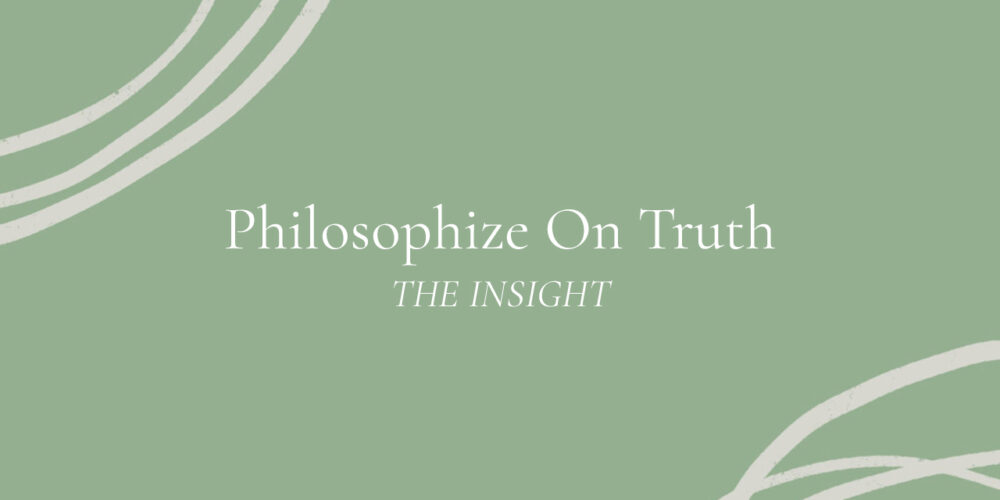Philosophize on Truth – The Insight
The nature of truth is not singular, definitely not linear. It...

This is the Ef Zin insight on Truth that you practice and experience in the program “How to Philosophize on Truth“.
We live in an era where we are bombarded with information, facts and images that seem to explain just about everything. We feel connected with the world and aware of our reality; part of the “bigger picture”. This “bigger picture” influences our perceptions of reality, our aspirations, and expectations of our life, ourselves; from our understanding of an entire culture and our expectations of a holiday, to our definitions of true love. And we find ourselves in conflict between what is held as true and what we feel, what we see as real and what we experience in our everyday life.
Many times we find that we fall short of expectations and we don’t fit in the reality that everybody else is seemingly enjoying. No matter the effort, our body is never slim enough, our relationship is not as inspiring as it should be, our nights out are not as exciting as expected, and parenthood might not be as magnificent as we thought. We question ourselves, our abilities, our personality traits, and in doing so cloud our self esteem, our self-confidence and limit our chance to true happiness. But instead of questioning ourselves, maybe we should be questioning the nature of that which we hold as truth. This is not to say that we should not accept facts, figures and images as true, but that we should be aware of the way we process them to reveal a truth that we take as universal and shape our lives around.

The nature of truth is not singular, definitely not linear. It flows and unfolds in the open field of reason only to be revealed in parts, folded together as different perspectives, and diverse in the views they express; true to the richness of nature and human nature. An image holds a thousand words, and a word a thousand images. Figures describe a situation but a situation describes moments that hold different meanings for different people, different viewpoints and different understandings. There is truth in everything written, reported and represented in images.
This truth needs to be questioned, revealed and understood every time it presents itself, every time we think of taking action upon the suggestions it makes. Today, we find ourselves accepting incomplete pictures, incomplete understandings and consequently, incomplete truths. As a result, we feel incomplete.
We need to make sure that our walk of life is true and meaningful, as a result of our experiences, our reasoning, and our true character. What we consider to be true should not exist as a whirlwind of images and recited data, but rather, we should own the truth that influences our perceptions and our lives. We need to come to our own understanding of the world, including ourselves, through the experiences we carry and the opinions we build. Our perspectives and thoughts should sprout from within, alive, active, ricocheting off the walls of our mind.
We need to use our reason to understand the world around us and find true meaning behind the obvious, behind what is taken for granted as true. Within the Ef Zin perspective, constructive dialogues set an example of how we can achieve a way of thinking that sets us free and empowers us as individuals. Emphasizing the process through which we come to conclusions and form our opinions rather than the opinions themselves. Encouraging us to question, to doubt, to be open to other ideas and perspectives, to work around concepts, process facts so we may achieve a personal understanding of ourselves and others. We should question and look for meaning, for truth, before we make choices, form opinions and take action. From philosophizing on the truths behind the choice of jacket slung on our shoulders and the friends in our circle, to the person in the president’s seat and even how stars disappear in the morning light.
What we don’t know is merely a playground for discovering truth, a place to ask, listen and learn.
It is our infinite opportunity for exploration, for awareness, understanding; the satisfaction and enrichment that leads to a wiser path and a meaningful life. “The mind is everything; what you think you become,” said Socrates. We need to draw out meaning behind the things we see, hear or read, questioning our reasoning and that of the others. Always trying to follow all the folds, weaves and knots that can make up a truth. We need to discover and define on our own the goals we set, the dreams we wish to fulfill, and the type of person we wish to become.
Recognizing how very little we actually know creates a passionate mind, as we challenge our way of thinking and that of others to inspire our thought, build our own individuality, and uncover the truth around us and inside us. And remembering that every time we believe we are at the end of a quest, there is always more to discover.
The nature of truth is not singular, definitely not linear. It...
Being real is the result of a self-discovery process that...
True balance is not found in the quantity of your activities or...
Communication involves creating and interpreting meaning. Within...
Like life itself, love is an activity that begins within you, it...
The experience of living is full of meaning, joy, light and...
As we make choices we develop our behaviors, energize our...
Being real is the result of a self-discovery process that...
Share in the comments below!